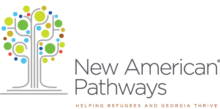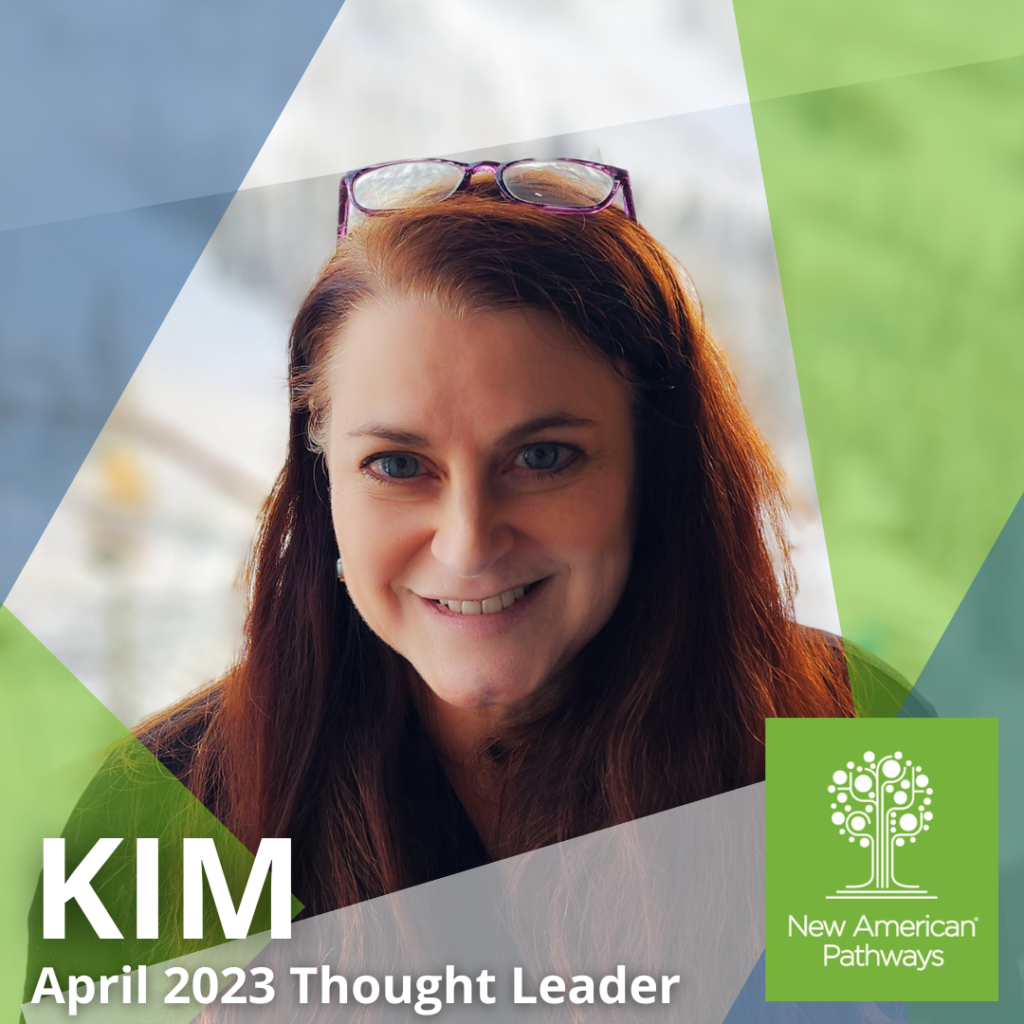Our April Thought Leader is Kim Verska, a lawyer in Atlanta and one of the owners and Managing Partners of Culhane Meadows PLLC. Kim has worked closely with our Ukrainian intake team as a volunteer and is a member of our Advisory Council. We interviewed her about her experience volunteering with New American Pathways and why she is passionate about our mission to help refugees in Georgia thrive.
Tell us about your occupation and how long you’ve lived in Atlanta.
My family moved to Atlanta when I was very young, and I met my husband Steve when we both attended Marist High School. So, I’ve lived in Atlanta for pretty much my whole life, except for when I lived and worked in DC during college (Georgetown University, Linguistics/Soviet Area Studies degree in 1991), during the two years I lived and worked in Moscow USSR (1987-88 and 1991-92) and when I lived in Boston for law school (Harvard, 1992-95). In 1987, I took a year off from college to go to Moscow as a nanny to a family at the US Embassy. It was a tremendous experience to live in Moscow during Gorbachev’s time when glasnost and perestroika were being newly launched. While my young charge was in school, I was able to work during the day in the Embassy’s Consular Department processing the applications of potential refugees, mainly Soviet Jews and Armenians. While I finished out my three more years at Georgetown, I helped the State Department design its refugee processing software and became Congressional Liaison to the State Department’s Soviet refugee program. After graduation, I returned to Moscow as the American Director of a human rights bureau, the Union of Councils for Soviet Jews, where I helped refugee applicants appeal denials by the INS. Work with refugees and immigrants has always had a special place in my heart, as my father’s parents came through Ellis Island after the Jewish pogroms in Ukraine in the early 1900s, and my mother was a child refugee in Austria after WWII until her mother married an American soldier.
After law school, I had a lot of debt, so I sadly left immigration work behind to become a business lawyer. I learned my current legal practice areas of technology and data privacy at two big Atlanta law firms. After I had my two daughters, I needed a more flexible arrangement, so I joined what we then called a “virtual law firm” with no physical offices and extremely low overhead. Currently, I’m one of the owners and Managing Partners of a firm of that type, which happens to be the largest full-service woman-owned law firm in the US, Culhane Meadows PLLC.
Why is volunteering important to you?
There is such a world of need out there, and as a Christian, I believe it’s my duty to bring my resources and skills to bear to help. I have always enjoyed doing pro bono and other volunteer work, making my small contribution as a foot soldier in an unfamiliar enterprise (e.g., building houses for Habitat or doing individual cases with the Georgia Justice Project). However, until I found New American Pathways, I never felt “called” to any of the volunteer work I’d done.
How did you connect with New American Pathways’ volunteer opportunities?
The circumstances that led to this happened of out of the blue, and at the exactly right time for me, as I had just become a new empty-nester. One of our friends knew that I had done refugee work and invited us to New AP’s charity event, which was described as benefitting Afghan refugees. My heart goes out to the many Afghani families who were collateral damage in the war, not to mention those who served alongside Americans to assist the US in its efforts. For this reason, I was not only happy to donate then and in the future, but wound up joining the Advisory Board of New AP. But then the war on Ukraine began, and I heard there would be a need to assist Ukrainians as well. Though the war itself is a tragedy, this made possible an opportunity for me that still seems to me like an answered prayer.
Why did you choose to volunteer at New AP?
I could not be more excited to volunteer at New AP, as I believe I have an unusual set of circumstances and skills that are well-matched for this particular opportunity. Not only do I have a work situation that allows me to carve out a morning most weeks to help out with Ukrainian intake, I have some Russian language and background in refugee work. Beyond that, I’m a lawyer, so I hope to be able to alleviate some of the workload of New AP’s immigration law team over time. There is no better feeling to me than being able to bring these old beloved skills (Russian, refugee work) together with new skills (research, lawyering) to fill a real need. I just hope I don’t annoy people with my enthusiasm!
What does a day in the life of a New AP volunteer look like for you?
While I did help out with translation for the non-Ukrainian/Russian speaking intake team in the beginning, the clients understandably prefer to speak Ukrainian, so now that the team is well-staffed with Ukrainian members, that early need has mostly gone by the wayside. Instead, lately I’ve been working to develop written materials that will be comprehensive and easy reference materials for the team. There are two special programs for Ukrainians now, but they intersect with regular U.S. immigration visas and laws in complex ways, so creating a matrix to understand all that was my first project. New American Pathways has been very supportive of this work, and once it’s finalized with help from their immigration team (Chris Collier and others), I hope to create more materials such as FAQs in English and Ukrainian that we can give out to clients.
What have you learned since you started volunteering with us?
To be honest, much of what I have seen since I started volunteering was no surprise to me – amazing teams (like that of New AP) somehow manage to succeed despite too much work, language problems and few concrete answers on the most important questions asked (“can we stay here in the US permanently?”); U.S. immigration law is very complex; and clients are in desperate circumstances looking for hope, but the law is the law and unlike in their countries of origin, there is no grey or black market way to solve these problems.
I will mention one thing that struck me as new though: the experience of sitting across from one client, and when I took her passport, I realized that she was the same age as me (54). But she had been through so much in the war, she looked like she was well over 70. Again, my heart goes out to these clients.
Is there anything else you’d like to mention or highlight?
There is nothing that tugs my heartstrings like Emma Lazarus’ poem on the Statue of Liberty about “give me your tired, your poor, your huddled masses yearning to be free…” The people who are willing to risk everything for a better future for their children are literally the engine that over time made the U.S. the great power that it became. I’ve done my Ancestry tree and that of my Slovak/Hungarian husband, and trust me, all our relatives were among these “huddled masses.” But here we all are now living a life those relatives could not have imagined. I am so grateful that they were willing to take that risk, and I want to be able to help keep this inspirational aspect of our country alive, no matter what.

